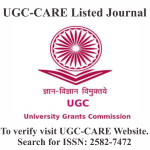TEACHERS’ PERSPECTIVES ON EDUCATIONAL INCLUSION: ANALYZING THE ROLE OF GENDER, EXPERIENCE, AND INTERACTION
DOI:
https://doi.org/10.29121/shodhkosh.v4.i2.2023.5946Keywords:
Teachers’ Perspectives, Inclusive Education, Educational Inclusion, Nep 2020, Students With DisabilitiesAbstract [English]
This study highlights the critical role of education in promoting the social inclusion of children with disabilities, focusing on global and Indian policy frameworks such as NEP 2020. It examined university teachers' attitudes towards inclusive education intending to bridge the gap in policy implementation due to challenges faced by educators and contribute to creating a more inclusive academic environment. This exploratory-cum-descriptive study adopted a survey-based quantitative research design to explore the attitudes of 115 randomly selected teachers from the 10 purposively selected higher education institutions in Rajasthan. This study adopted the Teacher Inclusion Attitude Scale developed by Ernst and Rogers (2009) to collect data using the 5-point Likert response method and used SPSS software to conduct an analysis of variance and t-test on the data. The study revealed that gender and teaching experience do not significantly influence university teachers' attitudes toward educational inclusion, but prior interaction with people with disabilities significantly shapes their perspectives on educational inclusion. Thus, the study emphasizes policymakers to prioritize teacher training programs that directly engage with people with disabilities to encourage inclusive attitudes in higher education.
References
Archana (2023). NEP 2020: An Effort Towards Transforming Inclusive Education. Shiksha Shodh Manthan, 9(1): 54-59.
Babik, I. and Gardner, E.S. (2021). Factors Affecting the Perception of Disability: A Developmental Perspective. Frontiers in Psychology, 12: 702166. DOI: https://doi.org/10.3389/fpsyg.2021.702166
Charania, A., Cross, S., Wolfenden, F., et al. (2024). Exploring teacher characteristics and participation in TPACK-related online teacher professional development in Assam, India. Computers and Education Open, 7: 100227. DOI: https://doi.org/10.1016/j.caeo.2024.100227
Charitaki, G., Kourti, I., Gregory, J.L., et al. (2022). Teachers’ Attitudes Towards Inclusive Education: a Cross-National Exploration. Trends in Psychology, 15: 1-28.
Contreras, D. (2023). Gender differences in grading: teacher bias or student behaviour? Education Economics, 32(6): 762-785. DOI: https://doi.org/10.1080/09645292.2023.2252620
Dey, S. and Srivastava, K. (2022). Perspectives of gender inequality in Higher Education in India. In: Oommen, N.M. (Ed.), Multi-faceted Perspectives of Gender Education: Reaching the Unreached (pp.60-67). CEAM.
Dignath, C., Rimm-Kaufman, S., van Ewijk, R., et al. (2022). Teachers’ Beliefs About Inclusive Education and Insights on What Contributes to Those Beliefs: a Meta-analytical Study. Educational Psychology Review, 34: 2609-2660. DOI: https://doi.org/10.1007/s10648-022-09695-0
Ernst, C. and Rogers, M. (2009). Development of the inclusion attitude scale for high school teachers. Journal of Applied School Psychology, 25(3): 305-322. DOI: https://doi.org/10.1080/15377900802487235
Kunz, A., Luder, R., and Kassis, W. (2021). Beliefs and Attitudes Toward Inclusion of Student Teachers and Their Contact With People With Disabilities. Frontiers in Education, 6: 650236. DOI: https://doi.org/10.3389/feduc.2021.650236
Manav, G., Muslu, K.G., Goktas, A., et al. (2024). Examining the relationship between middle school children’s attitudes toward their disabled peers and empathy skills. International Journal of Developmental Disabilities, DOI: 10.1080/20473869.2024.2401684. DOI: https://doi.org/10.1080/20473869.2024.2401684
National Sample Survey (2018). Ministry of Statistics & Program Implementation. Report no. 583 (2019): Persons with Disabilities in India NSS 76th round (July - December 2018). Press Information Bureau. Available at: https://pib.gov.in/ PressReleasePage.aspx?PRID=1593253#:~:text=583%3A%20Persons%20with%20Disabilities%20in,round%20(July%20%E2%80%93%20December%202018)andtext=The%20National%20Statistical%20Office%20(NSO,National%20Sample%20Survey%20(NSS).
Panda, A. (2024). Inclusivity in holistic education: A critical analysis of NEP 2020's approach to special education and differently-abled students. International Journal of Humanities and Education Research, 6(1): 108-111. DOI: https://doi.org/10.33545/26649799.2024.v6.i1b.83
Saini, M., Sengupta, E., Singh, M., et al. (2023). Sustainable Development Goal for Quality Education (SDG 4): A study on SDG 4 to extract the pattern of association among the indicators of SDG 4 employing a genetic algorithm. Education and Information Technologies, 28: 2031-2069. DOI: https://doi.org/10.1007/s10639-022-11265-4
Woodcock, S., Sharma, U., Subban, P., et al. (2022). Teacher self-efficacy and inclusive education practices: Rethinking teachers’ engagement with inclusive practices. Teaching and Teacher Education, 117: 103802. DOI: https://doi.org/10.1016/j.tate.2022.103802
Downloads
Published
How to Cite
Issue
Section
License
Copyright (c) 2023 Chandrika Soni, Dr. Preeti Singh

This work is licensed under a Creative Commons Attribution 4.0 International License.
With the licence CC-BY, authors retain the copyright, allowing anyone to download, reuse, re-print, modify, distribute, and/or copy their contribution. The work must be properly attributed to its author.
It is not necessary to ask for further permission from the author or journal board.
This journal provides immediate open access to its content on the principle that making research freely available to the public supports a greater global exchange of knowledge.




















